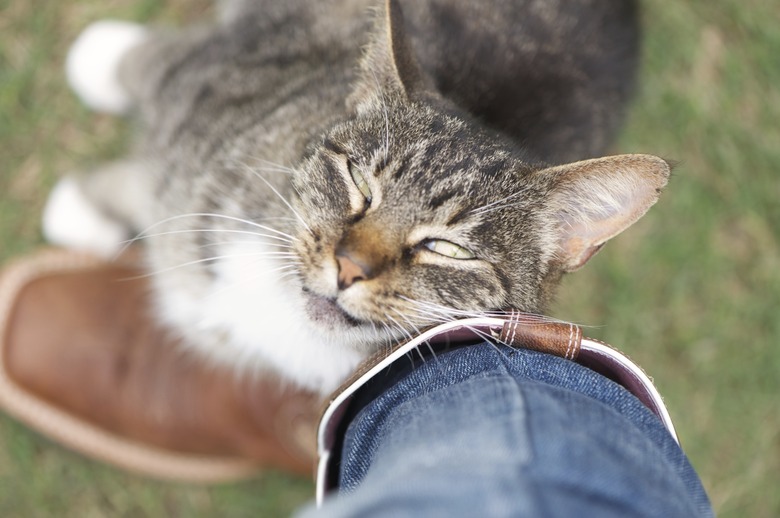Why Do Cats Rub Against You?
Why do cats rub against you? On first glance, it might appear that this behavior is a cat's way of trying to tell you something. It can seem annoying too if he repeatedly rubs his cheeks and nose on your feet or calves while you're trying to work at home. And yet, this action has deep meaning for the feline population. You may ask, "Why does my cat rub on everything?" but in reality, he's probably rubbing on some of the same items over and over. Cats are very particular about what they nuzzle up against, and they're methodical in their rubbing action.
Why do cats rub against you?
Why do cats rub against you?
It may seem like your cat is being affectionate when she's pushing her whole body into you, and it's kind of cute to have her head, cheeks, ears, and nose all smushed into your thigh. But the answer to, "Why does my cat rub against me?" goes beyond mere attraction to a pet's owner, and it starts with a little biology lesson.
Cats have 67 million scent receptors, while a human has just 5 million. With these special glands, a cat can transfer her scent to you, thereby marking you as her own. In fact, these receptors are so powerful that animal shelters encourage cat rubbing on a piece of cloth as a way of comforting stressed-out, anxious kitties who are awaiting adoption in cages.
Why do cats rub against things?
Why do cats rub against things?
In addition to marking their scent on rubbing cloths in shelters and on their special blankets once they've found a forever home, cats also rub against objects they want to claim. You might spy your pet pushing his chin, cheeks, head, and body hard against the carpet, a chair leg, his bed, or his scratching post.
This action signals that all of these things are now owned by your cat. Of course, you may not notice a distinctive odor on these objects, but if you have another animal in the house, he will definitely pick up on this scent. The reason for this is that feline pheromones, special chemicals that other creatures can smell, are transferred during the rubbing process.
Other funny feline body language
Other funny feline body language
Are you curious about other funny ways a cat expresses feelings? Beyond body rubbing, there are other ways cats show love, happiness, interest, and anger:
- Purring: That cute revving you hear is like a kitty motor, and it generally means your cat is content. Your pet may also purr to comfort himself the way a baby sucks his thumb.
- Kneading: This funny motion looks like your cat is playing the piano, and it's also called "making biscuits." You'll notice your cat pressing her paws up and down on a surface, such as her blanket, the couch cushions, or even your thigh (ouch!). Cats may knead in order to mimic the action they used to use when they once suckled their mother for milk.
- Licking: Cats lick and lick and lick some more to groom themselves, but they may also lick their owners to demonstrate affection toward them.
- Puffy tail: Watch out — this action means business. A tail that's swishing back and forth or one that's puffed up along with other body fur indicates a frightened cat who may lash out.
- Hissing: It's an awfully scary sound for sure, and it's one that's telling anyone within ear shot that your cat is mad or annoyed. Spitting and growling are also aggressive sounds you may hear.
- Meowing: The classic meow is a catchall sound that can mean a variety of things, including a way of greeting people or commanding attention. Cats also meow to complain about something, whether it's the way you're petting him or another animal in the room.
